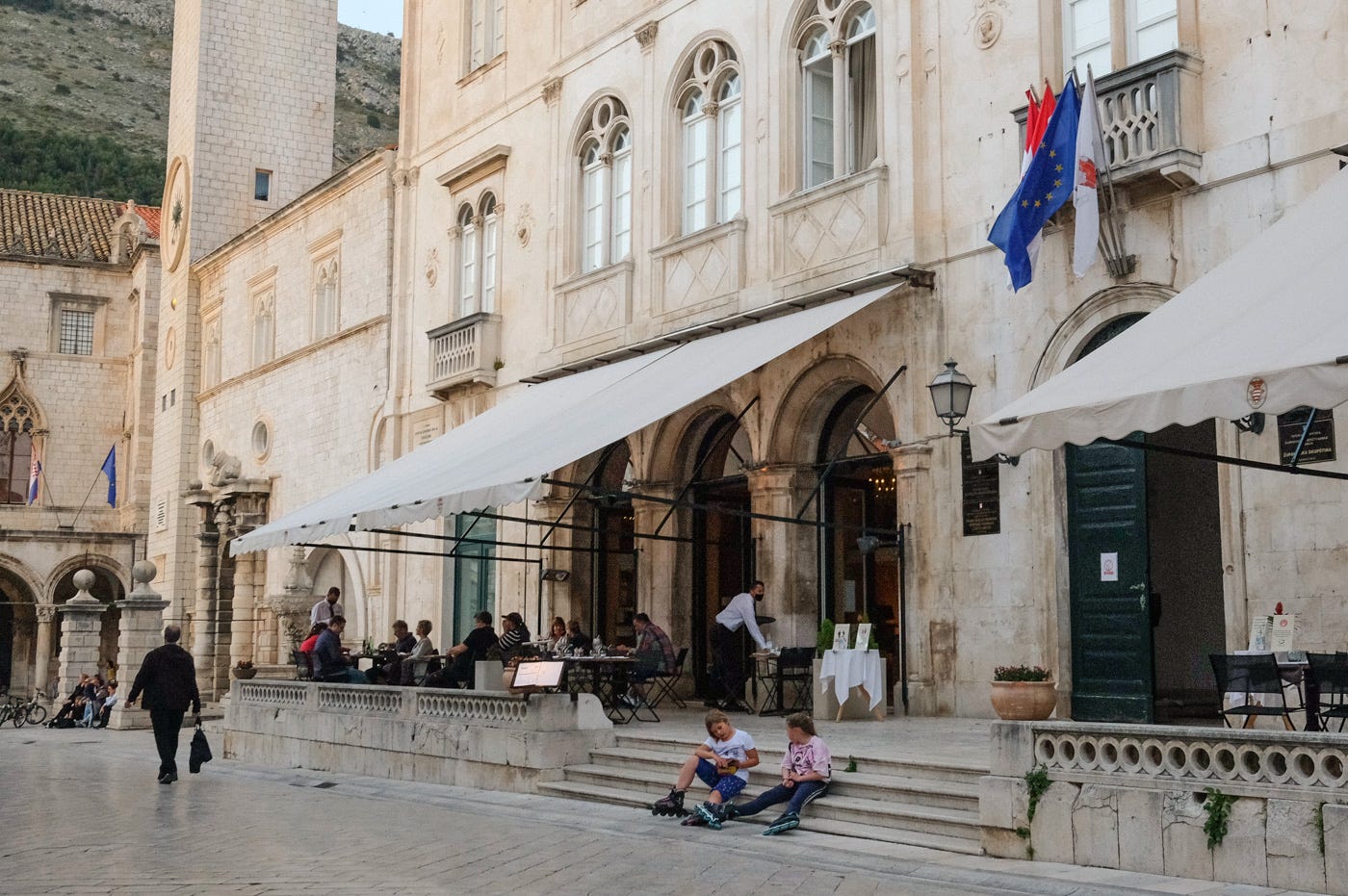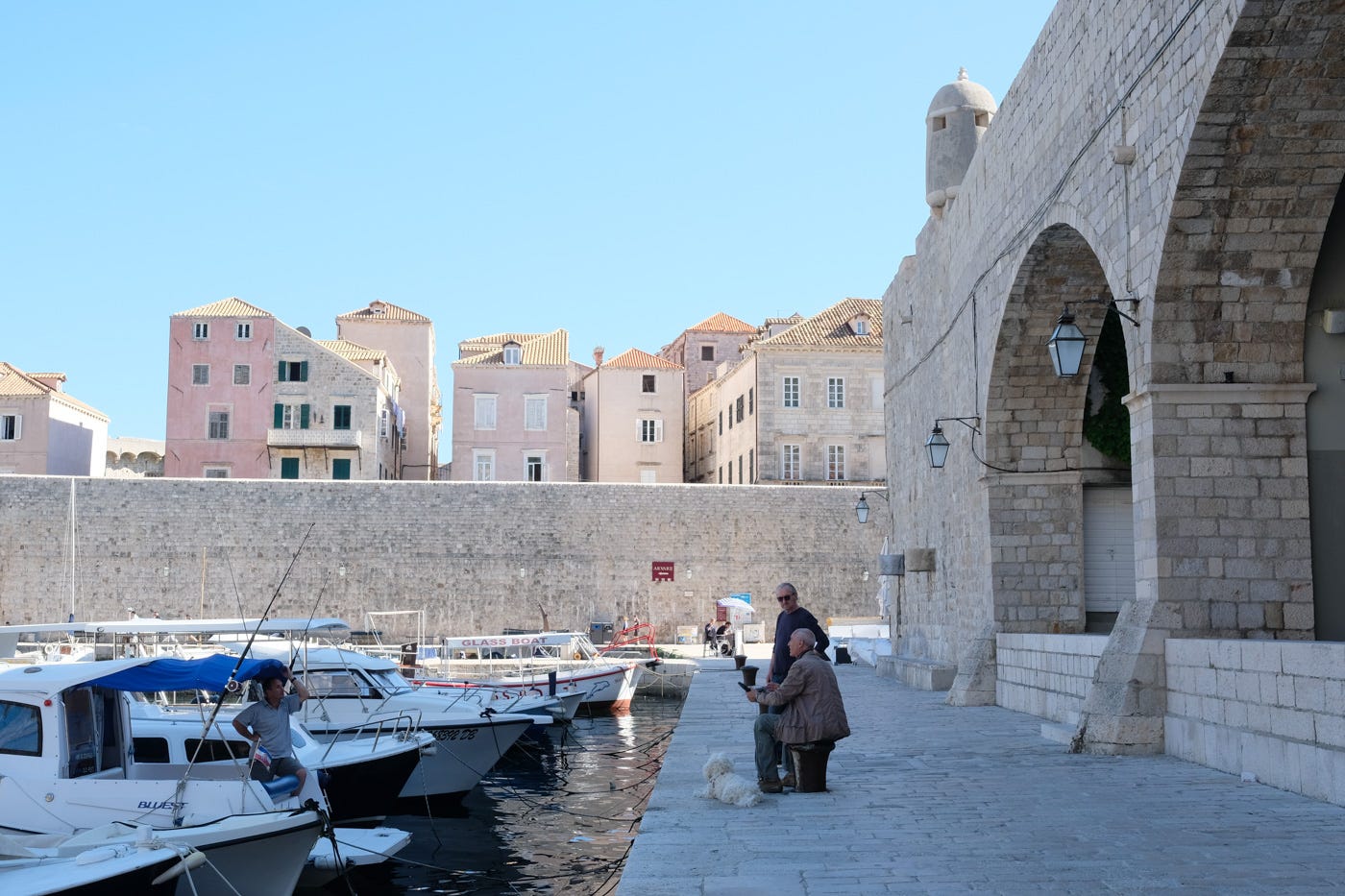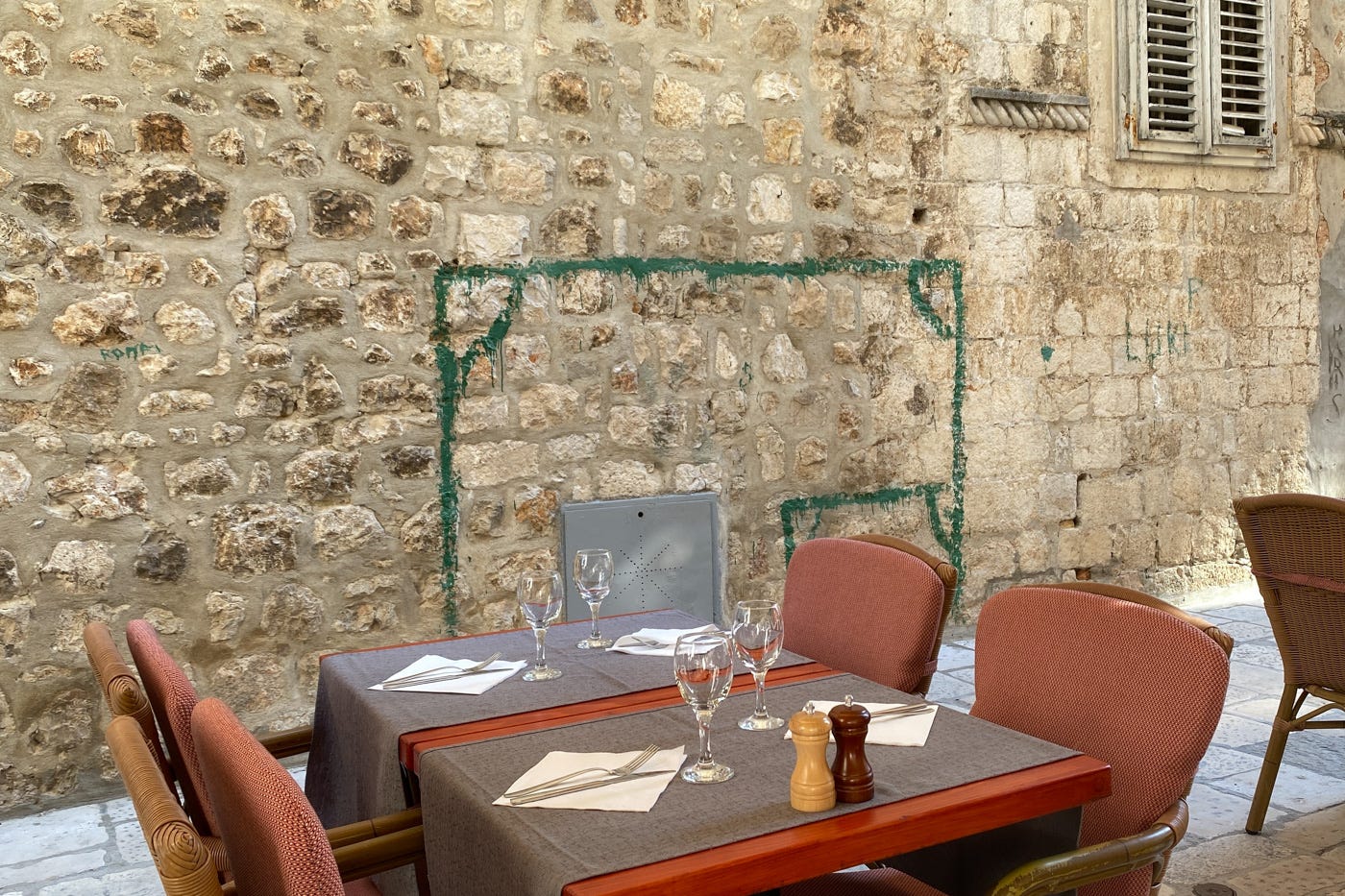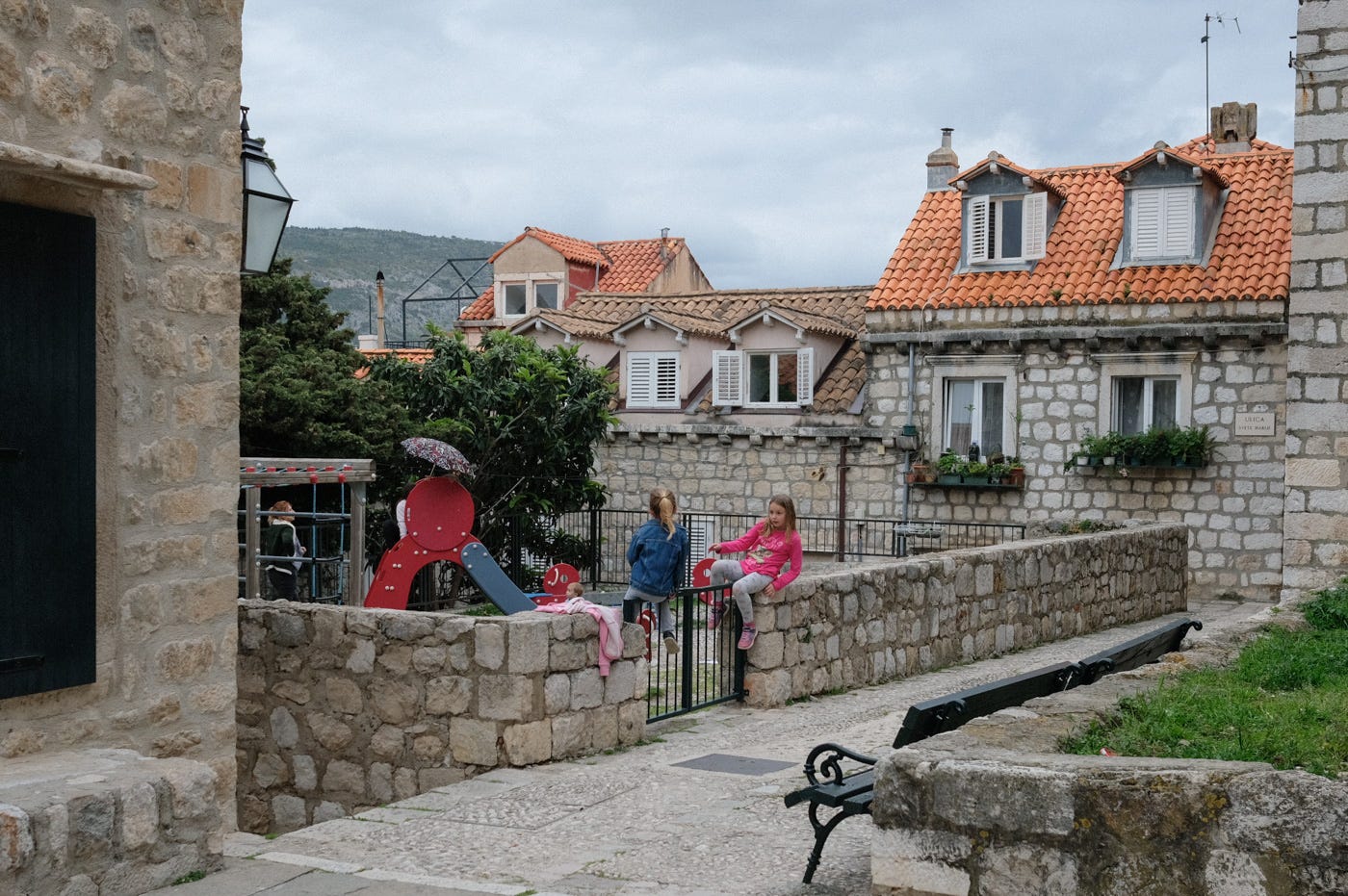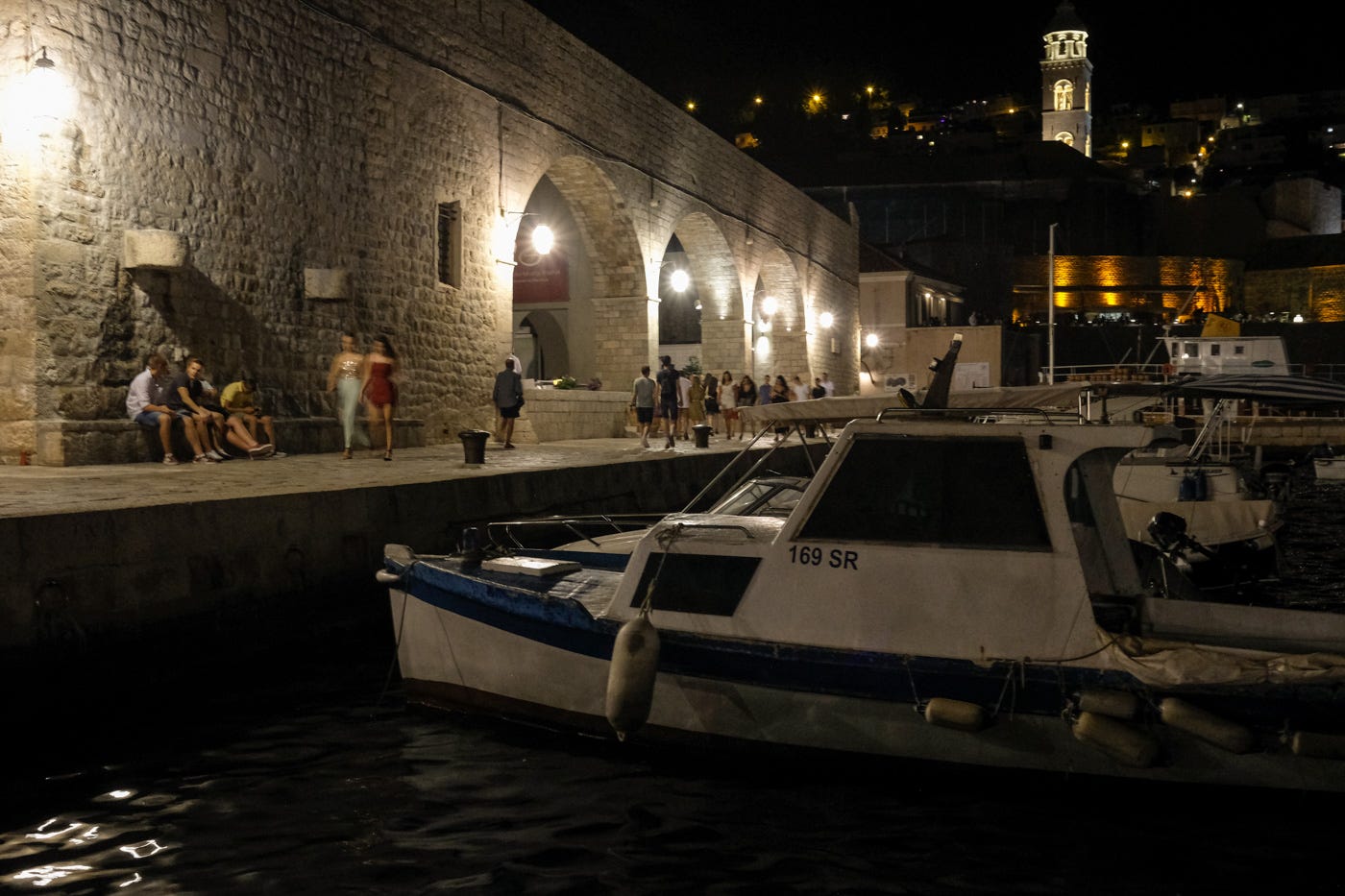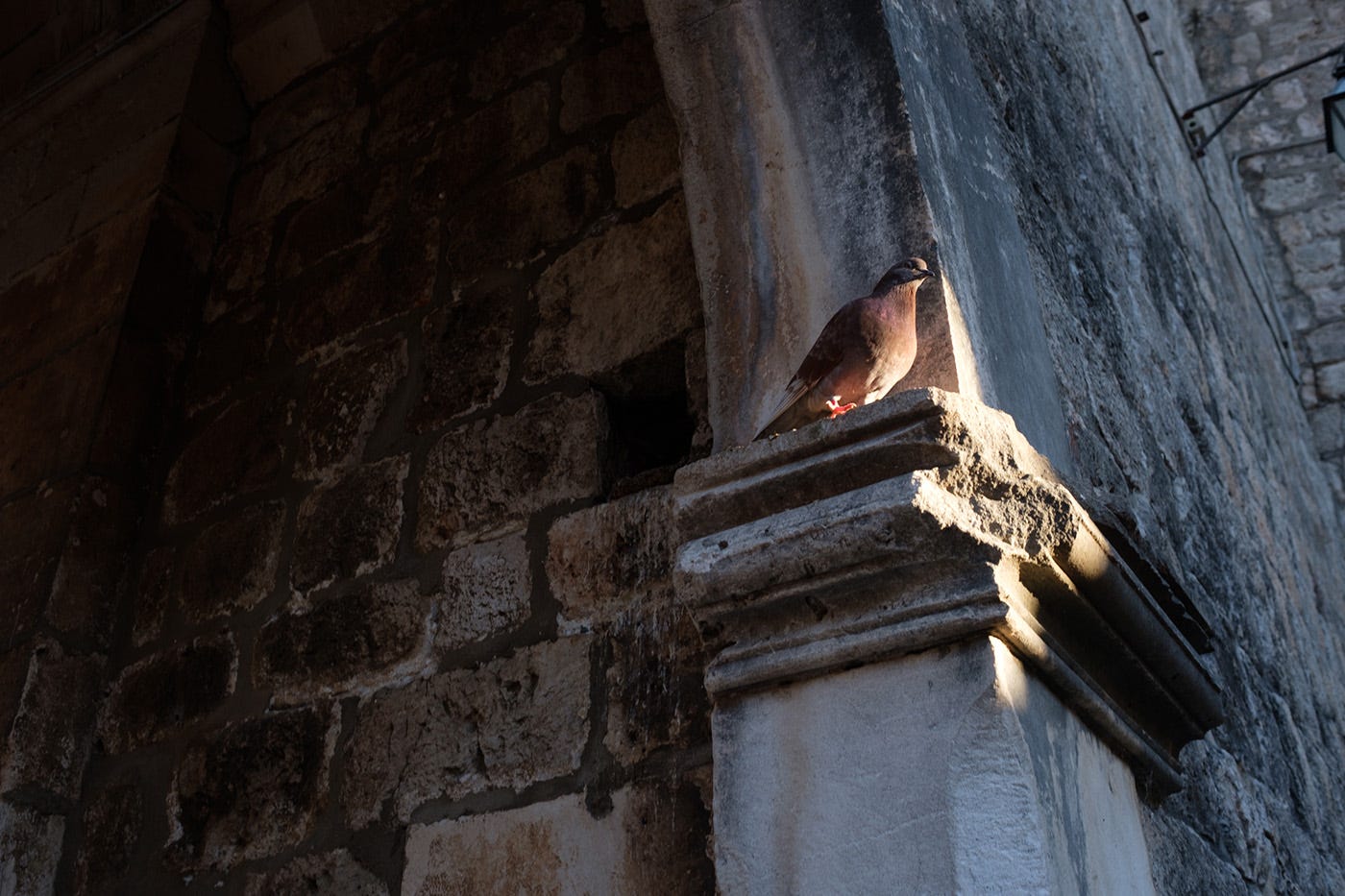From an old city by the sea #2
Studies in minor details: An exercise in watching people and noticing how this city—until recently a poster child for overtourism—is changing as it settles into summer.
The Croats are still experimenting with their identity in the same sort of way that people try out new hats. They are not yet certain they have found one with which they can feel comfortable. More than most peoples, they have assumed identities only to complain, sometimes with justification, that they are not suitable. In their time, they have been junior partners in Hungary, a dominion of the Habsburgs, played second fiddle to the Serbs in royal Yugoslavia, and then been one of the six theoretically equal republics in Communist Yugoslavia. Each arrangement has been angrily discarded.
A small but strategically positioned country on the crossroads of Europe, their lands have always been the object of predatory interest on the part of stronger neighbours. Divided and passed from one power to another, Croats weathered all these changes by adapting. A pragmatic survival instinct has served them well. But it has not come without cost. Too often, the Croats have settled for the role of passive onlookers in their own historical pageant, waiting for others to give directions.
—Marcus Tanner, Croatia: A History from the Middle Ages to the Present Day
It hasn’t escaped me that I failed to follow through on my promise to deliver weekly dispatches from Dubrovnik last month, in an effort to observe my surroundings more closely to root myself in place.
In part, it was because I had my busiest work month this year. But also, it didn’t feel like the right time to dispatch what I had already drafted up; in this pandemic, it often has not felt like the right time. But I’ll read about how Malaysia’s vulnerable communities are being pummelled by the sheer governmental incompetence that has exacerbated the worst effects of the pandemic, and hear from friends whose lives are so circumscribed they can’t even go outside and whose businesses and livelihoods are on tenterhooks—and feel incapable of hitting send. This isn’t the first time it has happened. I took a long while to dispatch my first letter from Dubrovnik too. (As I’ve told you, Croatia is one of the few countries where W.C. and I, of different nationalities, can both enter and stay together during this pandemic.) In the end, I did simply because putting whatever I’ve already written out there helps me move on mentally to other writing. And I can’t overstate how much that gives me the little bit of peace of mind I need, even if momentary, to move forward with my day.
Things are really bad at home, and it has culminated in multiple reports of suicides. From all this a movement has emerged from social media, asking Malaysians who need help to fly a white flag over their homes, and for other Malaysians to respond to their call. It was reportedly started by a group of young people who lost a friend under severe financial stress to suicide, and it began simply as an idea without any plan for centralized logistics. But it has since caught on, and activists on the ground as well as members of the public have been crowdsourcing resources and found a way to deliver them to those in need. If you’re looking to help, you can make a contribution to The Lost Food Project, follow Refuge for the Refugees (founded by Heidy Quah, a young activist with a truly infectious passion) for announcements of donation drives, or check out other organizations here. Some people have also put together a map and an app, called Sambal SOS, to help people locate food banks around the country.
So, after some hemming and hawing, here’s another letter from Dubrovnik I started writing a week ago about, well, people watching and charting the changes in the ebb and flow of daily life as more people come through its old town—set against its very recent past as an overtouristed Disneyland.
In the meantime, continue to stay safe, everyone. And I’m hoping that all of you have nothing worse than cabin fever to contend with 🩵
Watching and noticing, everything
It’s about half-past six in the evening and we’re sitting in a cafe overlooking the main square of Dubrovnik’s old town. Located at the east end of Stradun, the broad promenade that runs through the town from Pile Gate, it emerges from a baroque-period building and is one of our favorite spots for its elevated terrace. From here, we have a great vantage point to watch the growing parade of people.
It’s a relief, too, to be sitting in the shadow of the church opposite, named after the city’s patron saint, Blaise, whose statue appears everywhere here. Especially considering it’s about thirty-four degrees Celsius today—quite a jump from when I last wrote you all from here, when the temperature hovered at about twenty-five.
We’ve come here often enough to have enjoyed a free round on the house, which I guess makes us regulars. It’s something W.C. relishes, and something I’m learning to embrace in his company. On my own, I would feel self-conscious about having my whereabouts be so noticeable and accounted for—and not because I get up to anything particularly risqué! I think I’ve said it before, but it just feels more liberating when people can look upon you with absolutely zero expectations, so you can start off on a new footing every time—maybe you were too shy before, not talkative enough? Well, now you can be different—which is why I generally prefer the anonymity of a big city. And this is not a big city.
As jazz music wafts over from inside the cafe, I see a few people setting up large clusters of spotlights and a sound system on a scaffolded platform that has been temporarily erected alongside the church. A makeshift stage and rows of bleachers have also been installed to look out over a cluster of music stands and wooden chairs at the base of the church’s steps. Tonight, the Dubrovnik Symphony Orchestra will take its place here to rehearse for the opening ceremony of the annual Dubrovnik Summer Festival.
In late April, Dubrovnik was posting roughly twenty new coronavirus infections a day, while Croatia as a whole posted over two thousand. The numbers were high for a small country of just over four million people, but not, I think, distinctively so. Croatia had taken a comparatively amicable attitude with regard to its borders, taking in binational couples and digital nomads where other countries barred them along with tourists. But I heard that Dubrovnik had joined the wave of protests against overtourism in European cities, including Barcelona and Venice, in 2017—after it made the news in August when tourists were jammed at Pile Gate, unable to get in or out—and found myself looking for signs of reproach in every glance cast our way.
To my relief, I found people to be friendly, or at the very least, reservedly polite. People looking out their windows amid drying laundry said hello. The staff, graciously accommodating, expressly thanked us for coming. One man working a ticket booth to access the walls said, “This is really the best time for you. It’s not so busy, it’s never like this. But it’s not so good for us.” Even in early June, a restaurant off Stradun might serve just five tables all day, and the tour guide we engaged for a historical walking tour said we were only his sixth customers this year. This, while an estimated eighty percent of Dubrovnik residents depend on tourism to make a living.
I wrote in my previous letter from Dubrovnik that I had been initially half-hearted about coming here because I worried that even in a pandemic it would be too much of a tourists’ bubble in the holiday season—or, on the other hand, that it would be so quiet, having turned into a city that only came alive with tourists—that I wasn’t sure if it would sustain an extended stay. But I realize I had been too quick to judge. For one, Dubrovnik is more than just its old town. And even within the old town, upon closer observation, that isn’t true. At least, not right now.
Out of apparently 42,615 residents of wider Dubrovnik, only 1,557 are registered as living in the old town, down from 5,000 in 1991. Most properties you come across here will have a sign marking it “Sobe” or “Apartman”, since many of the old town’s residents have moved out to outlying neighborhoods like Lapad and the affluent Babin Kuk. But at a time when tourists do not so overwhelmingly outnumber residents (I’ve heard that it hasn’t been this quiet since the aftermath of the independence wars of the nineties against the Yugoslav People’s Army), we’ve seen glimpses of the local lives that make up the tapestry of this place, just by being around almost every day. And I imagine some of the townsfolk here have felt a little bit relieved, despite the economic pressures, to have this walled city again to themselves in the holiday season, which usually runs from April to October.
Until quite recently, the old town’s main square was still quiet enough that the local kids would use it as a playground every day after school, sending their ball flying sometimes onto the cafe verandah where we’re sitting, or bouncing off the church’s walls.
None of the adults seemed terribly concerned, and the kids enjoyed their free run of the place. All the while, they negotiated their own allegiances—we witnessed a couple of tantrums and fisticuffs, nothing bloody—and entreated the puppies and stray kittens that entered the fray, snapping their fingers at them.
If this sounds unremarkable, it’s not. In an NPR report, a resident barista recalled that “until the pandemic, she’d never seen local children play here before. She had only heard stories of it”, from a previous, nostalgic age. This made me think of the “goalposts” I’d noticed drawn on some alley walls in a thick green marker. A waiter who grew up in the old town pointed to one that was heavily faded and told us it’s a relic from some two decades ago, when there weren’t so many restaurants in the city. In fact, he said proudly, he’d drawn some of them himself.
These days, with more people milling in here, the kids don’t have the space to play football anymore. But we still see them clambering up and down the church’s perimeters, making a slide of the balustrades flanking its front steps.
In one corner, there’s a bronze statue of Marin Držić, a famous Croatian writer from the Renaissance period. They take turns climbing into his lap, polishing it clean. Then they grab his nose for balance, and polish that clean off, too.
All along Stradun, parents watch as their toddlers squeal and attempt to chase down waddling pigeons, which skid—I kid you not, they skid—in comically human fashion on the limestone tiles, slippery from the erosion of foot traffic, to escape chubby outstretched arms.
And there was a period, before the start of the school holidays in late June, when we would see teenagers with backpacks streaming steadily along Stradun in the early evenings, holding their phones close.
We also see young people around town carrying a violin or other instrument on their backs, headed, it would seem, for music practice. The Dubrovnik Symphony Orchestra has invited young musicians from the local high school to perform with them. And on days anticipating a performance, you’ll see several of them—once, strikingly: a long-haired girl flanked by two equally long-haired boys—striding down Stradun, dressed entirely, elegantly, in black, exuding a rarefied air.
Then, there are the regulars. The bespectacled kid who rides his bicycle single-handedly while watching videos, grinning to himself. The old man just sitting outside Pile Gate every night, alone, hands folded in his lap. The accordion man playing the same Game of Thrones melody. The restaurant staff (some juggling multiple jobs) we bump into over and over, but whom we don’t recognize when they’re off duty, having dispensed with their masks and uniforms.
On another day as hot as this, a young waitress at a cafe exclaimed, as she brought us our food, “I hate this!” You can’t blame her. Those uniforms—long-sleeved, all buttoned up—don’t make any sense in this heat.
With W.C. around, I’ve been noticing what I don’t notice, because he does. I guess that’s the kind of close attention you hone when you sketch scenes from real life as practice, every day.
I remember a woman once came up to us and peered over his sketchbook, and told him he’s a “life observer”, unlike the rest of us who are always on our phones. (Guilty.) I think it’s what makes him approachable to people, who readily strike up conversations with him—though more so when he’s on his own—and whom, funnily enough, we later pick out in video news segments about Dubrovnik.
I tell him he seems to have met some of the who’s who around here! But jokes aside, it is a small world, and I think some people have grown used to seeing us around—dropping in repeatedly just for coffee, hauling around unwieldy bags of groceries. We’ve also been here long enough for W.C. to have been pooped on by circling swallows many, many times, more than I can count on both hands. I’ve managed to avoid such dubious luck, haha.
These days, with more crowds streaming in (last weekend, there were reportedly about 11,000 visitors in Dubrovnik), the pleasure seekers—many of them Croatians—have become more visible. The night we arrived, you could hardly find anything open past nine at night, not even a convenience store. But the atmosphere has transformed, noticeably, I think, since the turn of June. Reservations have become necessary for dinner. Places have stretched their opening hours to midnight. Club music pounds the bars regularly on weekends, attracting lithe partygoers in short skirts and high heels. More large tour groups, some from cruise ships, are roaming the place. And restaurant staff now admonish the kids if they encroach too closely upon dining tourists, if a ball whizzes by too closely for comfort.
Stradun used to be a sea canal before it was filled in sometime in the twelfth century. At present, as the holiday season heats up it’s become something of a runway, where people come to see and be seen—dressed stylishly in flowing dresses or figure-hugging crop tops paired with cut-off jean shorts, towels dangling from around their necks after an afternoon dip in the sea. Many of them are accompanied by pedigreed dogs, of all kinds, from the ridiculously large to the ridiculously small. And of course, in a place like this, you’ll see newlyweds stepping cautiously through the streets, trailed by a photographer.
Dubrovnik has also grown more lively in recent weeks because of the European Football Championship. TV screens have started popping up in cafes, and at the end of June, as we sat in this very spot, we heard a sudden roar from the crowd next door, decked out in patriotic red-and-white checks, as a flock of swallows took to the sky and swooped cross Stradun in impressive formation and sharply turned a corner like it was running its own bird race. Just then, I got a text from a Malaysian friend in London: “are you following the football in croatia / they just came back from the dead / last 6 mins scored 2 goals / 3-3 with spain now / whole country must be going crazy hehe”.
I have to point out that I’m not a footie fan by any measure, and the only affinity I have with the game is an appreciation for its ability to bring disparate cultures together and to hit pause on wars, even for a day. However, I can always depend on this friend to keep me informed on what’s going on in that mystifying world whenever I’m traveling in a country with skin in a game. And alas! The Croats enjoyed only a short-lived euphoria.
It’s not all fun in the sun for everybody. One time, while having dinner in an alley cafe, the waiter started laughing and drew our attention to a man up a flight of steps who was trying to climb a ladder into a window. He’d forgotten his keys.
As I write now, dusk is settling. The spotlights have lit up the square, the musicians have taken their seats, and the dancers are standing at the ready. The rehearsal for the opening ceremony begins, and a small crowd gathers along the cordoned-off area.
Unlike in Malaysia, we’re not mandated to wear masks outdoors here, but as we haven’t been vaccinated we still try to keep a safe distance from other people and avoid crowds. Luckily, numbers in Croatia have gone down significantly since we arrived. The whole country currently turns up under a hundred new infections a day; Dubrovnik, fewer than ten. In a recent interview, city mayor Mato Frankovic announced that over ninety percent of tourism workers and more than fifty percent of the general population in Dubrovnik have been vaccinated, while tourists who enter the country have to present a vaccination certificate or a negative PCR test. So for now, at least, the forecast on Dubrovnik’s tourism season looks encouraging. Frankovic certainly sounds confident.
Once, as we climbed the steps of the old town to trace its perimeter along elevated alleys and crannies, we came upon an elderly woman we had sometimes seen making the trip to a grocery shop outside Pile Gate, pulling her trolley sack bag behind her. This time, too, she was coming back from a shopping run, and asked us for help to carry her things to her apartment, up several flights of steps. She has a hobble, and it makes me wonder how the elderly live here. It’s a car-free zone. There are obviously no elevators.
Her manner was gruff, even when she smiled and thanked us, but she offered us homemade mint tea when we arrived at her brambly doorstep. It was decorated riotously with potted plants, against a backdrop that must have been a discarded menu board from a shuttered Mexican cocktail bar. She showed us a yellowed family photo from when she was much younger, and we attempted a rudimentary conservation in a mixture of her super-basic English and our super-basic Croatian picked up from a guidebook before our trip.
Then, we realized that she was also the same granny we had seen in the main square another time. She had seemed to be lightly berating three adult men sitting on a corner pavement, who were watching their kids play. I recall that she poked one of the men in the legs repeatedly with her walking stick, while he laughed good-humouredly and attempted to shrug her off gently, even as one of his friends stalked off stone-faced and returned only after she had left. It was a funny scene that made us wonder how people relate to each other here. What are the tribes that make up this place?
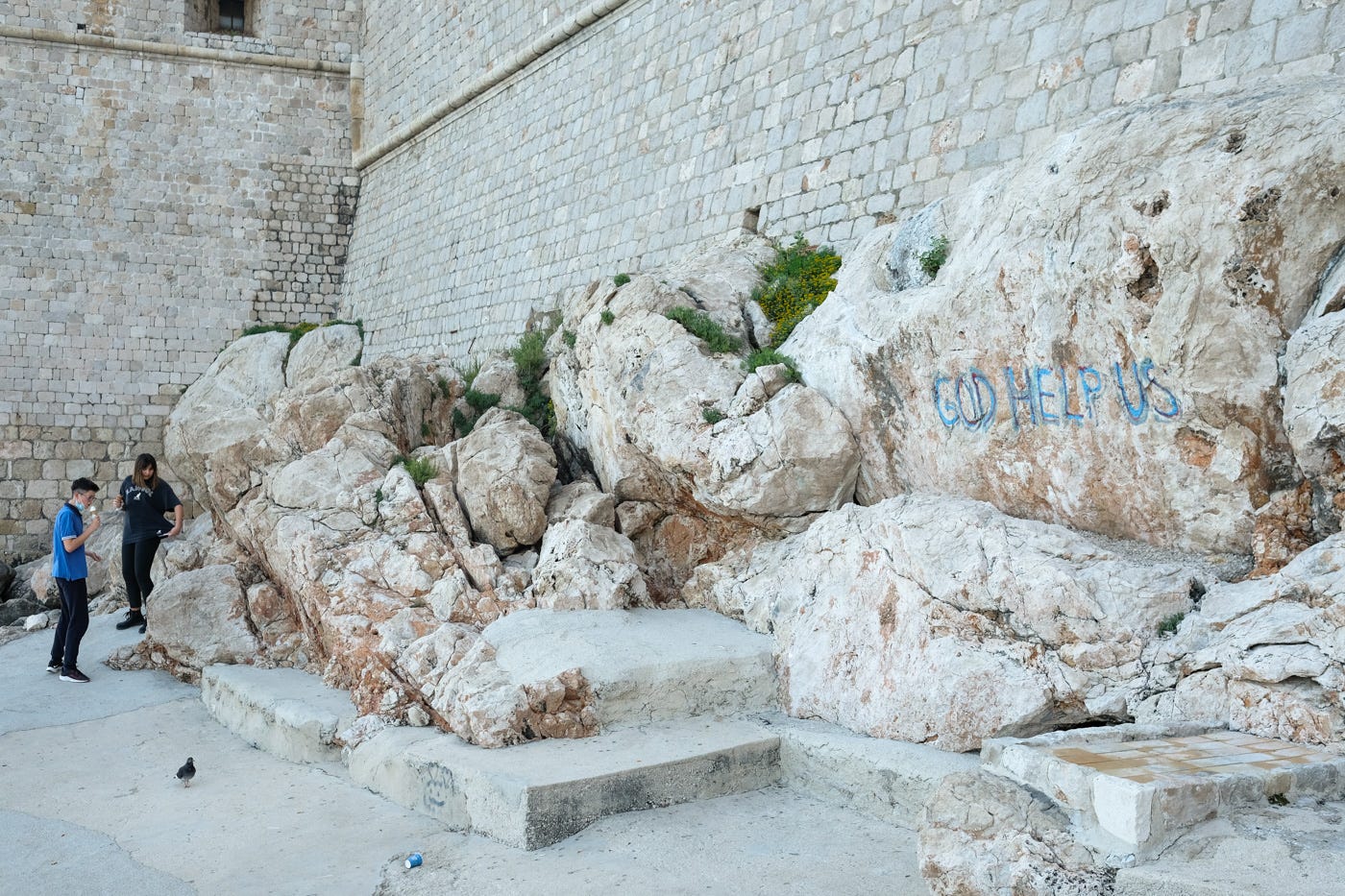
In June, while dining at a newly re-opened restaurant and tasting our first pasta istriana (a kind of denser, hand-folded penne that is delicious), we met a waiter in his twenties who grew up in Dubrovnik and had spent some years in Germany as a student and seemed none too happy to be home. He had been looking forward to a trip back to Germany for a friend’s wedding, and now worried that he would not be able to make it because of the spreading delta variant and the stricter restrictions it may bring back, especially since he wasn’t vaccinated at the time.
We asked him if Dubrovnik had changed much over the decade, and he snorted. “No, it is exactly the same. Exactly the same. That’s why when all the young people finish their studies here, they leave. It’s a very Croatian story, you know?” He also talked about how the city compared to previous years: “It was so crowded! Always when I was trying to get to school, carrying my backpack, these tourists would just stop, and they just stand there to take photos. And I’m like, ‘Stupid tourists!’ But then I go to other places and I’m the stupid tourist.” He laughed.
It must be complicated, when tourism makes up a fifth of your country’s GDP, when your country is the most tourism-dependent country in Europe—many thanks to Game of Thrones. The biggest problem here are the cruise ships. When unchecked pre-pandemic, Dubrovnik would see eight to thirteen vessels unloading their passengers in a day during the holiday season. Locals complained that these sightseers don’t just crowd the city, they also don’t contribute much economically, since they usually just disembark for a few hours and return to their ships to eat and sleep.
Some measures were taken between 2017 and 2019 to reduce the problem of overcrowding—restricting the number of cruise ships to two a day, capping visitors to the old town at 4,000 any one time, shuttering eighty percent of the city’s souvenir shops, proposing a ban on the opening of new outdoor restaurants. But before their impact could be assessed, the coronavirus happened. In any case, it’s been pointed out that Dubrovnik, a sliver of a city built on mountains, rocks, hills, and narrow valleys located next to bays, has little room to build more holistic infrastructure to accommodate the numbers of tourists it regularly receives. Development has mostly meant “blasting rocks to build new accommodation facilities and small shops rather than constructing better pavements, roads and highways”.
This so-called Pearl of the Adriatic is a living testament to how important it is to keep the excesses of tourism in check. And I guess if there is a silver lining in this challenging year, it’s that it has forced us to reimagine what that might look like. With some caveats, I still think of travel as a force largely for good, and that as such, it should be open to everyone, not just the privileged—which is why the way in which some initiatives to combat overtourism are couched bothers me, such as Indonesia’s bid to welcome more “quality tourists”, by which they really seem to mean fewer but higher-paying customers.
In a conversation we had with a walking tour guide, he lightly disassociated himself from the 2017 protests, pointing out that the city was historically always a crowded place anyway as it had always been at the intersection of people, ideas, and trade due to its enviable position on the Adriatic coast. And for another, he said, it’s the responsibility of the local government to control tourism, not for tourists not to come. In a recent TRT World short, a shopkeeper similarly said, “I was sincerely sorry for those people who came from all over the world to see Dubrovnik and then suffocated in the crowd.”
Louise Doughty, an English writer who had an unpleasant experience in Croatia, says that tour companies should shoulder some of the blame, and resist offering packages to destinations with already heavy footprints, even if it means losing out on tourist dollars.
One afternoon in May, as we were strolling along the old port, a man perched on a boat interrupted a conversation with his greying friends sitting on the embankment, to ask if we wanted to go out to the islands. He would take us, he said. Anything could be arranged; prices could be negotiated. “Go with him,” his friends urged us. We said we still had some time in Dubrovnik and would think about it for later, and we meant it.
Then we continued on our way, intending to take in the breeze at the tip of the protruding pier. A few minutes later, the man started walking towards us. We had stopped at a kiosk selling boat tours along the way, and I supposed he was worried about the competition. “Please,” he said, pressing his palms together when he got to us. “Please. When you want to go, please come to me.”
He was soft-spoken and hustled without the air of a hustler. I hated to see someone being forced to do this. We told him yes, we would come and find him when we eventually make a decision. But the price for renting a private boat is steep. And since then, fearing we would have to pass on his offer again, my heart has felt a little heavier every time we meandered too close to his booth. Every time, I hoped we wouldn’t see him or his boat. If we didn’t, maybe it would mean he had managed to find some customers that day.
Then, one night two weeks ago, as we sat in the back terrace of the same cafe we’re at now, looking over the old port: I saw his slim white vessel, looking like a silverfish in the flickering glow of the streetlamp besieged by frenzied moths. On another evening, enjoying the breeze by himself, he had waved to us with a silent smile. But tonight, he wasn’t alone. He was having a tête-à-tête with a long-haired blonde in the open rear of his floating home.
At some point, he stretched out to lay his head in her lap, and I felt a rush of joy for him. I hoped that whatever his current difficulties in this pandemic, this seaman was enjoying a moment of peace. (Or perhaps a quickening heartbeat.)
Now, on another evening, as I finally send this off: a pigeon is doddering around us with only one proper leg—the other is a stump. We’ve actually noticed several pigeons with unusual feet configurations, different from the standard three claws in the front and one at the back. Minor details, I know. But these dispatches from Dubrovnik are precisely intended to be studies in minor details. And, as it turns out, there’s a theory that pigeons in cities sometimes lose a toe or two to amputation by human hair. What?! Yes. Scientists have looked into this. And there’s definitely a hairdresser’s, maybe even two, on Stradun.
Yours,
E.




